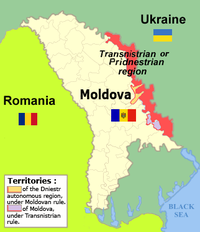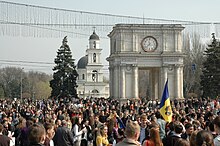History of independent Moldova
On 29 July 1989 a pro-reform Communist Mircea Snegur was appointed Chairman of the Presidium of Supreme Soviet of Moldavia (Speaker of the Parliament).
At the end of a year that had seen Semion Grossu and his organization pummeled from both the national revivalist right and the "ultrarevolutionary" internationalist left, Moscow replaced the First Secretary with Petru Lucinschi in a snap Central Committee plenum on 16 November 1989.
President Mircea Snegur's opposition to immediate reunification with Romania led to a split with the Moldovan Popular Front in October 1991 and to his decision to run as an independent candidate in the 8 December 1991 presidential election.
On 21 December 1991 Moldova, along with most of the former Soviet republics, signed the constitutive act that formed the post-Soviet Commonwealth of Independent States (CIS).
The end of the planned economy meant also that the industrial enterprises would have to buy supplies and sell their goods by themselves, and most of the management was not prepared for such a change.
[citation needed] International financial institutions, judging the apparent presence of landmarks indicating a modern developed society in 1992, have overestimated the capacity of Moldova's economy and government to withstand the transition to market economy, and imposed the country to open its market to outside goods without implementation of any effective action to support internal production.
[citation needed] Officially, Moldova's annual GDP is of the order of $1,000 per capita, however a significant part of the economy goes unregistered due to corruption.
[citation needed] Moldova's transition to democracy was initially impeded by an ineffective Parliament, the lack of a new constitution, a separatist movement led by the Gagauz (Christian Turkic) minority in the south, who declared the Gagauz Republic, and unrest in the Transnistria region on the left bank of the Dniester river, where a separatist movement assisted by uniformed Russian military forces in the region and led by supporters of the 1991 coup attempt in Moscow declared a "Dniester republic".
The Soviet system was falling apart quickly, and Moldovan leadership decided to rely on itself to bring the breakaway Transnistria back under its control.
Authorities in Transnistria, refused to allow balloting there and discouraged the local population from participating; only some 7,500 inhabitants voted at specially established precincts in right-bank Moldova.
Although the cease-fire remained in effect, further negotiations that included the Conference on Security and Cooperation in Europe and the United Nations made little progress.
[1] In March and April 1995, Moldovan college and secondary school students participated in a series of strikes and demonstrations in Chişinău to protest the government's cultural and educational policies.
The government's final decision was postponed until the fall of 1995 because of the stipulation that six months must pass before a proposed change to the constitution can be made.
In the presidential elections of 1996, parliamentary speaker Petru Lucinschi surprised with an upset victory over the incumbent, Mircea Snegur, in a second round of balloting.
It established the institutional framework for bilateral relations, set the principal common objectives, and called for activities and dialogue in a number of policy areas.
However, activity of the new government of prime-minister Ion Ciubuc (24 January 1997 – 1 February 1999), was marked by chronic political instability, which prevented a coherent reform program.
Moldova received an International Monetary Fund special mission advising the government on how to cope with the effects of the Russian crisis.
Privatization was stalled, the Moldovan leu lost 60% with respect to the US dollar within a year (August 1998-July 1999), an energy crisis swept through the country, wages and pensions were paid with a considerable delay of several months, corruption extended.
The level of life plunged, with 75% of population living below the poverty line, while the economic disaster caused 600,000 people to leave the country.
Disagreements that appeared within the Alliance for Democracy and Reforms, caused to some degree by displeasure with seat distributions, led to its disintegration and an overwhelming Party of Communists victory in 2001 parliamentary election.
He also repeatedly announced plans to introduce measures to promote land consolidation in the countryside, a move outside observers have dubbed "recollectivization."
In March–April 2002, in Chişinău, several mass protests took place against the plans of the government to fulfil its electoral promise and introduce Russian as the second state language along with its compulsory study in schools.
[1] The government mainly renounced these plans, but Russian was eventually re-introduced as a compulsory subject in Moldovan schools, albeit only 1 to 2 hours per week.
[citation needed] An attempt at re-introduction of Russian into Moldovan schools caused protests in the center of Chisinău, led by the nationalist Christian-Democratic People's Party, and was aborted as the movement lost momentum.
In the wake of the November 2003 deadlock with Russia, a series of shifts in the external policy of Moldova occurred, targeted at rapprochement with the European Union.
A national commission for European integration was created in June 2003, and in November 2003 all three political parties present in the parliament adopted a common declaration stating a pro-European orientation of Moldova.
In the summer of 2004, Transnistrian authorities forcibly closed four Romanian-language schools in Tiraspol, Bender, and Rîbnița that used the Romanian language in the Latin alphabet.
A wave of protests began on 7 April 2009 in major cities of Moldova (including the capital Chişinău and Bălţi) after the results of the election were announced.
Rioters attacked the parliament building and presidential office, breaking windows, setting furniture on fire and stealing property.
A subsequent attempt by the ruling coalition to amend the constitution of Moldova via a referendum in 2010 in order to enable presidential election by popular vote has failed to meet the 33% turnout required.







